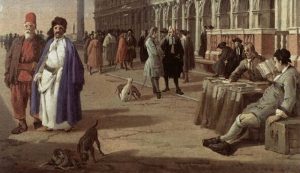Last night I dreamed that I was living back in Ithaca (or somewhere very much like Ithaca), and that I was organising an APEE panel with Walter Block on the subject of Venetian libertarianism.
In the real world, I haven’t lived in Ithaca for nearly three decades; and while I am currently organising an APEE panel, I’m not doing it with Walter and it’s not on Venetian libertarianism.
But when I woke up, the reference to Venetian libertarianism reminded me of this passage from William Thomas, a Renaissance-era Welsh traveller who described his visit to Venice in a 1549 memoir:
All men, specially strangers, have so much liberty there that though they speak very ill by the Venetians, so they attempt nothing in effect against their state, no man shall control them for it. … Further, he that dwelleth in Venice may reckon himself exempt from subjection. For no man there marketh another’s doings, or that meddleth with another man’s living. If thou be a papist, there shalt thou want no kind of superstition to feed upon. If thou be a gospeler, no man shall ask why thou comest not to church. If thou be a Jew, a Turk, or believest in the devil (so thou spread not thine opinions abroad), thou art free from all controlment. For eating of flesh in thine own house, what day soever it be, it maketh no matter. And generally of all other things, so thou offend no man privately, no man shall offend thee, which undoubtedly is one principal cause that draweth so many strangers thither.
(William Thomas, The History of Italy (1549), ed. George B. Parks (Ithaca NY: Cornell University Press, 1963), p. 83.)
 Of course, the requirement to “spread not thine opinions abroad” (at least in matters of religion) suggests that this freedom had its limits – though I’m not sure whether Thomas intends this restriction to apply to all three of the non-Christian religions he references, or only to devil worship. Still, Thomas’s description of Venice is reminiscent of Voltaire’s and Addison’s descriptions of the London stock exchange; all three passages illustrate commercial society’s capacity to promote cosmopolitanism and toleration.
Of course, the requirement to “spread not thine opinions abroad” (at least in matters of religion) suggests that this freedom had its limits – though I’m not sure whether Thomas intends this restriction to apply to all three of the non-Christian religions he references, or only to devil worship. Still, Thomas’s description of Venice is reminiscent of Voltaire’s and Addison’s descriptions of the London stock exchange; all three passages illustrate commercial society’s capacity to promote cosmopolitanism and toleration.
This is so weird. Not to change the subject (entirely), but a few weeks ago, I had a dream that I was organizing a conference on the foundations of ethics. I don’t know the exact location, but part of the dream took place at Erez Crossing (between Israel and the Gaza Strip) and part of it took place in the company of a lot of naked people (location uncertain but also irrelevant).
In the real world, I visited Erez Crossing this summer, am organizing an Author Meets Critics symposium on terrorism, and was recently detained by the police on suspicion of being a terrorist.
https://irfankhawajaphilosopher.com/2017/12/10/a-memo-to-friends-and-colleagues/
Anyway, though I’m not in Venice, at least I’m in Lodi. Lodi, New Jersey, that is.
I was a little worried at first that you’d had a dream that reminded you of William Thomas, but having read the post more carefully, I’m greatly re-assured.
Yikes! I missed your initial report on this adventure.
Do you still hang out with Walter Block ever? Someone told me you aren’t affiliated with the Mises Institute any longer but I wasn’t sure if that was accurate.
I’ve had a parting of the ways with the Mises Institute, but I’m still friends with many people in it, including Walter.
OK thanks for confirming!